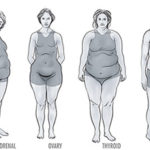
To stay healthy and function properly, the human body requires not only macronutrients – protein, carbohydrates and fats, but also micronutrients (vitamins and minerals). These can be obtained from foods or vitamin and mineral supplements, but are generally widely available in natural sources, making it easy for one to get the needed amounts on a daily basis so as to prevent deficiencies.
However, people who follow restrictive diets and those who completely eliminate some groups of products from their menus are likely to develop mineral and vitamin deficiencies. Although these deficiencies don’t develop spontaneously, there are some minerals – like iodine, iron and zinc – which require special attention.
Mineral imbalances can result not only from improper eating habits but also from hereditary disorders and kidney problems, so it’s important to know the early symptoms of the common mineral deficiencies in order to prevent complications.
Magnesium is an essential mineral required for the normal metabolism of carbohydrates and amino acids, as well as for maintaining the acid-alkaline balance inside the body. It accounts for about 0.05% of the total body weight, and ensures a healthy absorption of calcium, sodium, potassium and phosphorus.
When levels of magnesium are too low, symptoms like the following ones can occur:
In most cases, the early magnesium deficiency symptoms are subtle, and the condition usually starts with leg cramps, foot pain, twitches in muscles, as well as with fatigue, nausea, loss of appetite and general weakness. Unless the intake of magnesium is increased, these symptoms can lead to more serious complications, such as numbness in hands and feet, seizures, altered heartbeats, back pain, tension headaches and coronary spasms.
Iron deficiency is the most common mineral deficiency in the world, but it’s often neglected, as its symptoms are not specific. The earliest sign of iron deficiency or anemia is increased tiredness which doesn’t go away after sleeping or taking a nap.
Iron is the main carrier of oxygen throughout the body, and without enough amounts of this mineral, the functioning of all cells and tissues can be altered. Low levels of iron can lead to headaches, stomatitis, constipation, dizziness, memory problems, irritability, palpitations, gastro-intestinal upset and brittle nails.
Fatigue, glossitis (the inflammation of the tongue), a weak immune system, difficulty in maintaining a normal body temperature, decreased work performance and slow cognitive development in kids can also be signs of low iron levels.
Calcium is requires not only for keeping your teeth and bones strong, but also for a healthy heart and cardiovascular system. This mineral is the most abundant in the human body, and is found mostly in bones and teeth (99%), the remaining amount being stored in soft tissues, blood and intracellular fluids.
Without calcium, bones become weaker, risk of osteoporosis increases, cardiovascular problems can occur and blood clotting can be impaired. Also, the body’s pH balance can be disrupted and nerve transmission can be impaired, as calcium helps in the transfer of nerve impulses.
Early signs of calcium deficiency include tetany, muscle cramps and numbness, tingling in legs and arms, joint pain, heart palpitations, brittle nails, insomnia, excessive irritability and eczema. Unless the intake of this mineral is adjusted, other health issues such as increased cholesterol levels, back pain, cognitive impairment, kidney stones, osteoporosis, periodontal disease, depression, panic attacks, bone spurs and arthritis can develop.
Zinc is another trace mineral the body requires for its normal functioning, this chemical being present in all tissues. It is involved in protecting the body and fighting diseases, as well as in the Krebs cycle that provides the body with usable energy. Also, this mineral is needed for the proper clotting of blood, for thyroid’s normal function, for the metabolism of proteins, fats and carbs and for fetal development.
Zinc deficiencies can lead to serious health problems, such as blindness, infertility, hair loss, anorexia or bulimia, birth defects, loss of sense of smell, memory loss or sterility. Still, these complications can be prevented if the intake of zinc is adjusted when the first signs start manifesting.
The early symptoms of zinc deficiency include the occurrence of acne spots, apathy, slow healing of wounds, digestive issues, eczema, fatigue, bad body odor, poor ovary function, high levels of cholesterol, white spots on nails and a weaker immune system that makes one more prone to ailments.
Iodine deficiency affects nearly two billion people worldwide, and 18 million children per year are born with impaired mental abilities caused by the lack of this mineral in their parents’ diets. Iodine is crucial for the healthy development of the human body and for normal growth, this mineral being involved in the production and regulation of hormones.
The lack of iodine affects the developing brain, lead to miscarriage and still birth, increase the risk of suicidal behavior, lead to lethargy, confusion and hallucinations, shortness of breath, chest pain and pressure, palpitations and wheezing. Still, these symptoms only appear in severe cases of iodine deficiency. The earlier signs of this nutritional problem include:
Regular check-ups can identify these mineral deficiencies in time and prevent complications. However, an even better preventive measure is to make sure you follow a balanced diet, which includes all the needed groups of macro- and micronutrients.
If you plan switching to a restrictive or elimination diet, such as a vegetarian, vegan, gluten-free, lactose-free or low-calorie diet, make sure to ask for your physician’s advice and to add nutritional supplements to your menu, as recommended by your health care provider.
We’d like to hear your thoughts on this topic, so make sure to join our Facebook community and share your ideas and suggestions with us.

Updated on: 08.09.2021 The lymphatic system is involved not only...

Stress can make you gain weight – we’ve heard this...

Various theories exist to answer this question. As you will...

Our series of whole body vibration machine exercise articles continues...

Both rebounding and jumping on a trampoline are excellent ways...